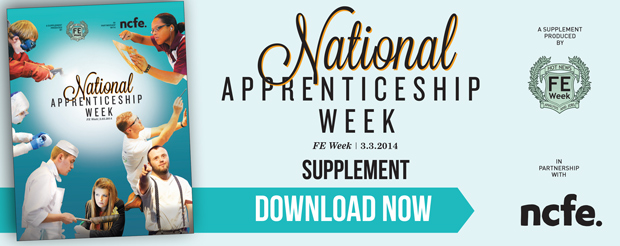While National Apprenticeship Week rightly celebrates the programme, we shouldn’t forget the problems those on it face, says Joe Vinson, vice president, further education, National Union of Students.
National Apprenticeship Week is dedicated to the thousands of apprentices across the UK and it is a celebration of the positive impact they have on individuals, businesses and the wider economy.
Apprenticeships are fantastic for businesses, personal careers and creating opportunities for both employers and apprentices, but unfortunately the fact is that vocational study and apprenticeships often aren’t viewed with the same esteem as other routes of education.
This is evident right from the start of the study leaver’s journey, from the sheer lack of information, advice and guidance in schools, universities and colleges.
It should be shaped in collaboration with the learners themselves, but at the moment the information and advice available to students is patchy and often not very good.
Research from the National Union of Students last year showed that more than 50 per cent of university students were reported as being unaware of the apprenticeship opportunities available to them.
We’ve even found that some students have been told that they are “too clever” to think about going down this route.
How can learners begin to shape their own destiny without a guarantee of impartial careers advice?
More needs to be done to ensure that apprenticeships are valued and promoted as much as the other choices available to students.
Especially because with many not being able to afford tuition fees for university, other career options are looking more enticing.
Our own research, however, has showed that the apprenticeship minimum wage — a measly £2.68 per hour — could be a major deterrent for those who would otherwise consider apprenticeships.
The government’s own evidence last year showed a fifth of apprentices were paid below even that pathetic wage.
Research from the Equality and Human Rights Commission indicates that pay and the quality of apprenticeships are inextricably linked.
Traditionally male apprenticeships such as engineering and construction have better wages, more classroom time, and more on the job training than traditionally female apprenticeships, such as hairdressing and childcare positions.
The very best apprenticeships are doing what they can to combat this, but this kind of quality should be standard practice, not a luxury for the lucky ones.
The low wages paid to apprentices stack up problems in other areas of their lives too.
They have little disposable income and let’s not forget that many have to pay to travel to work or to college.
We’ve heard stories of apprentices who have to pay almost £10 a-day to travel to work while on the apprentice minimum wage.
We’ve heard stories where apprentices are only paid for the four days they are in work, but not for their study day in college. How can anyone expect to live a decent life on such a low income?
We need more than just naming and shaming.
We need a clampdown on those who are choosing to exploit hardworking young people trying to get their foot on the career ladder.
We need to raise the esteem of those choosing their own vocational path into adulthood. We need to view apprenticeships with the same respect that other educational choices receive.
We need to make sure that all young people are aware of all the choices they have on offer to them. And we need these things now. Apprentices must have a voice. And we will make sure they are heard.










Your thoughts